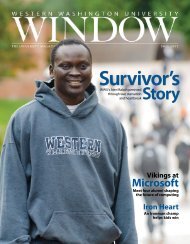WINDOW
Pushing - WINDOW - The magazine for WWU
Pushing - WINDOW - The magazine for WWU
- No tags were found...
You also want an ePaper? Increase the reach of your titles
YUMPU automatically turns print PDFs into web optimized ePapers that Google loves.
Once he joined the team,<br />
he found another cause…<br />
the legislature's plan to<br />
make homosexual activity<br />
punishable by death.<br />
Photo by REUTERS/Xavier Toya<br />
The defendant: Thomas Kwoyelo, a former commander in Uganda's brutal Lord's<br />
Resistance Army, faces 53 counts of murder, kidnapping and destruction of property.<br />
But unlike 26,000 other former LRA soldiers and commanders, Kwoyelo was<br />
not offered amnesty by the Ugandan government.<br />
reprisals against<br />
the Africans who<br />
made up the rest of<br />
the team. In return,<br />
Pirtle would gain<br />
invaluable experience<br />
in a high-profile case, experience that would help him make<br />
the transition from trial law to the human rights arena.<br />
Next legal target: Ugandan anti-gay laws<br />
Once he joined the team, he found yet another cause. One of his<br />
Ugandan legal partners told him of the Ugandan legislature's<br />
plan to make homosexual activity punishable by death on a second<br />
“offense.” Ninety-six of Uganda's 100 legislators said they<br />
would vote for it. Pirtle signed up for the court battle to try to<br />
block the proposal from becoming law.<br />
Legislators have since backed off the death penalty in favor<br />
of legislation that calls for life in prison. Nonetheless, says<br />
Pirtle, “It's an affront to human dignity.” Already, gay and lesbian<br />
Ugandans live in fear, he says. "They can’t love who they want to<br />
love. They can't tell their family about their sexuality. They can’t<br />
tell their friends.”<br />
So far, Pirtle hasn't made a dime on his human-rights work<br />
and has spent some $15,000 of his own cash for travel and<br />
lengthy stays in Uganda. But then, he didn't take the case for the<br />
money. “I'm an idealist,” he says.<br />
Uganda may be just the place to test his values. The country<br />
gained independence from British colonial rule in 1962, but the<br />
new nation was a conglomeration of ethnic groups that could<br />
not come together to form a working government. In 1971, the<br />
dictatorial Idi Amin grabbed power and engineered the slaughter<br />
of 300,000 opponents. His successor left another 100,000<br />
dead between 1980 and 1985.<br />
Then most of the country settled down to stability and economic<br />
growth. But in late 1980s, warlord Joseph Kony and his<br />
Lord’s Resistance Army began its two-decade campaign against<br />
the government in northern Uganda, a campaign marked by<br />
kidnappings and unspeakable brutality.<br />
Kidnapped boys became soldiers. To indoctrinate them, the<br />
boys were often forced to kill family and friends. Kidnapped girls<br />
became sex slaves. When LRA members wanted to intimidate<br />
opponents or exact revenge, they simply hacked off limbs.<br />
The LRA is now in disarray. Most of Kony’s fighters have accepted<br />
amnesty and returned home to rebuild their lives. Kony<br />
and a few hundred supporters are believed to be hiding in remote<br />
jungles of central Africa. Earlier this year, the U.S. government<br />
offered a $5 million reward for his capture.<br />
Before law school, the Navy and Philosophy<br />
Pirtle came to human rights law in a roundabout way. After<br />
graduating from a Nevada high school, where he played defensive<br />
back on his high-school football team, he spent a year at the<br />
University of Arizona and then joined the Navy. He served on<br />
an aerial reconnaissance crew, operating radar equipment and the<br />
infrared camera used to see at night. “We flew all over Asia and<br />
Australia,” he says. “Most of the missions entailed flying around<br />
and seeing what was out there.” In effect, his unit served like a<br />
city cop on patrol. “We found arms dealers and human smugglers,”<br />
he recalls.<br />
When his hitch was up, he enrolled in Western Washington<br />
University, majoring in Philosophy. He then earned his law<br />
degree from Seattle University's School of Law. Initially, he<br />
planned a career in environmental law. “I don't have a whole lot<br />
of aptitude for that,” he recalls.“I did have an aptitude for trial<br />
work.”<br />
Fresh out of law school, he took the case of a friend who<br />
had gotten into a legal dispute with his former business partner.<br />
Pirtle filed a $25,000 tactical lawsuit against the former<br />
partner to try to encourage her to settle. The strategy backfired.<br />
Photo by REUTERS/Edward Echwalu<br />
She hired one of Seattle’s top law firm's and countersued for<br />
$250,000.<br />
“I thought we had a strong case,” says Pirtle. “Our greatest<br />
weakness was that I didn’t have any experience. I was learning as<br />
I went along.” To Pirtle's amazement, he won a judgment at the<br />
trial court level and won again when the verdict was appealed.<br />
“If we had lost, it would have ruined him.”<br />
Today, Pirtle’s practice includes criminal defense and personal<br />
injury cases. But he wants to shift from local trial work to<br />
the international human-rights arena and is seeking to set up a<br />
foundation to help support the work. “The people we represent<br />
obviously can't pay,” he says.<br />
In the meantime, he’s working for free because he believes<br />
in the cause. “He’s very serious when it comes to the things he’s<br />
passionate about,” says his longtime friend Greg Reilly (’00,<br />
Economics) a lieutenant commander at the U.S. Coast Guard’s<br />
Pacific Area Headquarters.<br />
“Maybe it comes down to the fact that there are a couple of<br />
different sides of James. One side of him is a soldier. The other is<br />
that he has a very liberal justice-oriented outlook on life. So he's<br />
a soldier for things he really believes in.”<br />
And that commitment may have an impact that extends well<br />
beyond his work in Uganda. By taking human rights into the legal<br />
arena, Pirtle is helping to change the way human-rights cases<br />
are fought. “There’s certainly a place for trial lawyers to effect<br />
change,” says Philosophy Professor Ned Markosian, who had<br />
Pirtle as a student. “Not a lot of that is being done. The focus has<br />
been on trying to raise awareness of the issues. By bringing cases<br />
to court, he’s filling an important niche.”<br />
So far, Kwoyelo’s legal team has won in Uganda’s<br />
Constitutional Court, which ruled he was wrongly denied amnesty<br />
and should be freed. But the government refused to let<br />
him go. Normally, Pirtle and his partners would have taken the<br />
case to Uganda’s Supreme Court. But the court is currently short<br />
members and can’t form a quorum.<br />
So Kwoyelo’s defense team has taken the matter to the<br />
African Commission on Human and Peoples’ Rights, hoping for<br />
a ruling that he should be released. While the commission has<br />
no enforcement power, Pirtle says a favorable ruling could put<br />
political pressure on Uganda to free him.<br />
Unanswered questions<br />
Kwoyelo is now middle-aged. Since his first year as a teenager,<br />
he has spent his life at war or in prison. If the charges against<br />
him are true, Kwoyelo has committed acts that would violate<br />
the laws of any civilized society. The only issue left is what to do<br />
with him – further imprisonment, execution, or freedom.<br />
But Pirtle believes the case involves deeper, more complex issues.<br />
“Where does moral culpability begin?” he asks. “What happens<br />
to the psychology of a child who is kidnapped and forced<br />
to be a soldier?<br />
‘We're talking about a 13-yearold.<br />
I can't get that out of my<br />
mind. I was 13 once.’<br />
“I can't answer that. But I know the consequences would be<br />
devastating,” he says. “If this had happened to any of us, what<br />
would we be like?”<br />
Doug McInnis is a freelance journalist who has written for the New<br />
York Times, Popular Science and many university magazines. His<br />
most recent story for Window was about Eric Dinerstein (’75), chief<br />
scientist of the World Wildlife Fund.<br />
32 <strong>WINDOW</strong> • Fall/Winter 2013 • Western Washington University<br />
www.wwu.edu/window<br />
33








